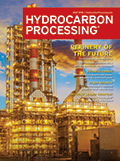
July 2016
Special Report: Refinery of the Future
For many years, industry researchers have worked to find more cost-effective alternative processes than traditional hydroprocessing for upgrading petroleum fractions.
Refineries are large, highly automated, complex systems involving hundreds of people, thousands of work processes, thousands of control loops and tens of thousands of input/output points.
The last time we saw such marked activity in the methanol industry was back in the 1990s and early 2000s, when methanol production in North America plummeted by almost two-thirds.
Process Control and Instrumentation
Most companies and plants have taken steps to implement some degree of industrial cyber security control.
Process Engineering and Optimization
Summarizing the outcome of the technical evaluation in Part 1 of this technical study, a tailor-made process route should be chosen for proper C<sub>4</sub> hydrocarbon processing to obtain the best benefits from case to case.
Fluid Flow
A study has been performed on the vibrations and stability of fluid-conveying pipes with guided ends. Guided ends are the most common type of pipe ends, as they enable the pipe to have free movement.
Water Management
Cooling water systems play a critical role in the efficient operation of hydrocarbon processing facilities.
Environment and Safety
Managing the competency of company personnel is a critical aspect of process safety.
Columns
In early June, Hydrocarbon Processing held its annual International Refining and Petrochemical Conference (IRPC). In its seventh year, the technical conference and exhibition returned to Italy for two full days of downstream technical presentations.
Machinery quality assessment (MQA) is similar to bid conditioning, and both relate to structured efforts.
Industry standards mandate safety lifecycle management (SLM). Most industrial organizations are aware of and comply with those standards.
Fuel refineries in earlier decades would preferentially process light sweet crudes, for the right price, to maximize gasoline and distillate production and to meet sulfur specifications with less cost.
As engineers and managers, we are often approached by parents or friends interested in a technical career for their children or others.
This article is the second under the “Codes and Standards” series.
Trying to predict how global refining markets will look in 2026 is a losing proposition. The only thing we can count on with any real certainty is uncertainty.
Trends and Resources
Day One of Hydrocarbon Processing’s annual International Refining and Petrochemical Conference (IRPC) featured a special tour of eni’s Sannazzaro de’Burgondi refinery.
Most of the focus on Asian downstream capacity construction revolves around large consuming nations, such as China and India.
The impact of Canadian and French refinery outages caused margins to fall slightly in the Atlantic Basin and Europe, despite stronger gasoline demand and higher inventories.
At present, Hydrocarbon Processing’s Construction Boxscore Database is tracking over 2,100 projects around the world.
Appleton, an Emerson brand and a global supplier in hazardous-location electrical products, announced an expansion to the Areamaster LED series.
Dr. Alexander Horch has been named as the new head of development at HIMA Paul Hildebrandt GmbH.

- SkyNRG starts construction on its first SAF plant in Delfzijl, the Netherlands 2/13
- India's Reliance wins U.S. license for Venezuelan oil 2/13
- Singapore light distillates stocks hit over 3-yr high on robust imports 2/13
- Three contractors injured at ExxonMobil facility in Beaumont, Texas (U.S.) 2/13
- China's epic renewables boom lifts it into rare clean capacity club 2/13
- TotalEnergies booked loss in France due to refining activities, CEO says 2/13




